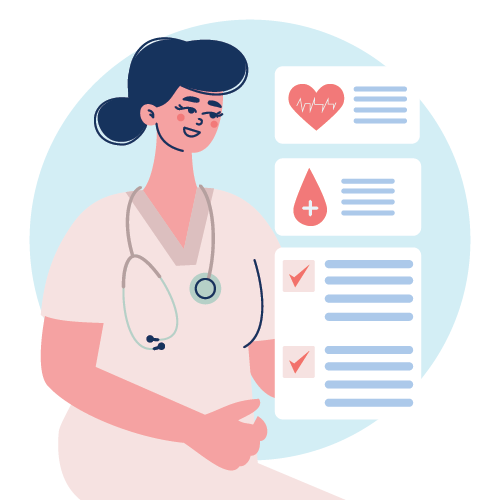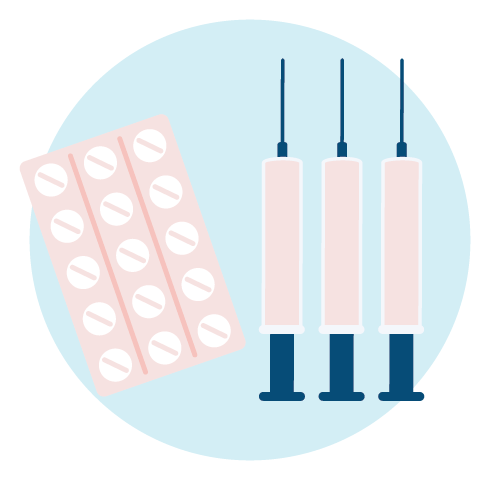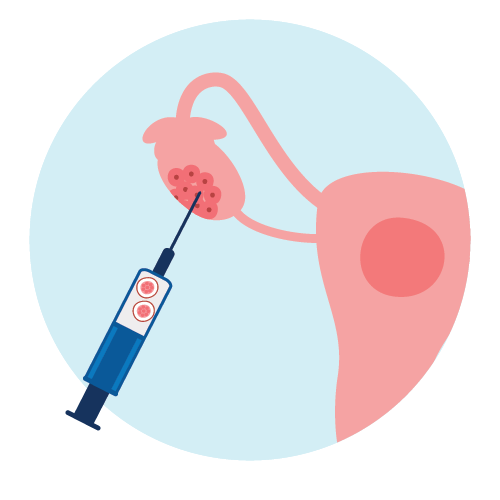Egg Donation at RMA of New York – Long Island
How It Works
The egg donation process is typically comprised of four main stages: donor screening, donor selection, ovarian stimulation, and egg retrieval.
Compensation
Not only does egg donation offer the chance to help another woman create a family, but there’s also a financial benefit. Compensation for time associated with egg donation is currently $10,000 per completed cycle. Approved donors may donate up to 6 times, which could mean potential earnings of up to $60,000.
FAQs
Answers to frequently asked questions about the egg donor process to help answer questions and ease any concerns you may have.
How It Works
It's important to note that not all women will qualify to become egg donors. To be accepted as an egg donor at RMA of New York – Long Island, an applicant must submit an application, be between 21-31 years old and fully screened medically, know her family's medical history, and successfully complete a psychological screening. The donor must also be an American citizen, hold a valid social security number, and have dependable transportation.
If you meet these criteria and are interested in proceeding, we invite you to complete our egg donor application. Once our Donor Egg Team reviews your application, you could be asked to take part in our screening process.
![]()
Step 1: Donor Screening
We understand that becoming an egg donor can be a significant decision. Rest assured that we take the screening process seriously to ensure the safety and well-being of all parties involved. Our caring social worker will guide you through the evaluation, which includes an in-depth test to assess any potential psychiatric or personality issues that could interfere with the donation process. We also explore your motivations for donating. Your commitment to follow through is essential to becoming an egg donor.
A background check will also be conducted, which may include:
- Arrest history
- Motor vehicle search for alcohol-related offenses
- Civil financial check
- In the event that a questionable incident does arise in our investigator's research, additional interviewing is conducted to confirm that the donor is of good character
The medical exam and evaluation will include:
- Assessment of ovaries on day 2 or 3 of period
- Blood tests to determine general health and confirm the absence of certain communicable diseases
- Gynecological exam including cultures for communicable diseases
- Genetic screening
- Drug screening by hair sampling
After successfully completing all the necessary screening tests, your anonymous information will be made accessible to individuals seeking donated eggs. If you're chosen as a donor, you'll transition to the next phase in the process, and we'll be here to support you throughout the journey.
If you have any questions about the application process, please call 631-752-0606.
Step 2: Donor Selection
In the event that a recipient selects you, one of our coordinators will contact you to notify you of your selection. Afterward, you will have a consultation with one of our nurses who will walk you through the procedures involved. You will receive a calendar specifying the dates and appointments for which your availability is required, as well as instructions on daily medications. You may also be required to begin taking a birth control pill one month before the stimulation phase.
![]()
Step 3: Ovarian Stimulation
The ovarian stimulation phase of the egg donation process usually lasts for two weeks. After being chosen by an intended parent, we will work together to plan your cycle. During the stimulation phase, you'll receive injectable medication (gonadotropins) to stimulate your ovaries to produce more eggs than a typical cycle. You will come into the office every day or every other day for blood work and transvaginal ultrasounds to monitor egg development. These tests help us determine when the eggs are mature enough to retrieve. Before the egg retrieval, you'll need to take HCG and/or a Lupron Trigger to finish the follicular maturation. The HCG injection is given approximately 36 hours before your scheduled egg retrieval time.
![]()
Step 4: Egg Retrieval
Egg retrieval is carried out at our Melville office. The procedure typically lasts no more than an hour, although you will need to stay on-site for about 3 to 4 hours. It's important to arrange for a responsible driver to accompany you and drive you home.
During the egg retrieval, you will be sedated and a needle will be passed through the vaginal wall using an ultrasound guide to enter the fluid-filled sacs in your ovaries. Once the eggs are retrieved, you will be transferred to the recovery room where you will be monitored until you are stable enough to be discharged. Pain is managed with extra strength Tylenol, and normal activities can usually be resumed the following day.
After you have been discharged, the donated eggs will be fertilized in our embryology lab to complete the process. Approximately two weeks after your retrieval, you should have a post-retrieval period. You can then contact our office to schedule a post-retrieval sonogram to confirm that your ovaries and uterus have returned to normal.
Compensation
Not only does egg donation offer the chance to help another woman or couple create a family, but there is also a financial benefit. Compensation for time associated with egg donation is currently $10,000 per completed cycle, and approved donors may donate up to 6 times. This means the potential for earning up to $60,000 while making a life-changing impact.
Egg Freezing Benefit
Choose the elective egg freezing option that's right for you:
An Elective Egg Freezing Cycle. This is offered to repeat egg donors at a substantially reduced cost. In this cycle, all of the eggs would be frozen for your future use. Medications included. Egg storage fees apply.
An Elective Egg Freezing Cycle with a Shared Donation. Qualified repeat egg donors cycle again, but share the eggs this time. Half are frozen for your future use and the other half goes to the donor recipient. You get half of the eggs, plus $5,000 (half of the usual $10,000 egg donor compensation). Medication included. Egg storage fees apply.
Frequently Asked Questions
Here are some of the questions we hear most often.
Women between the ages of 21 and 31 are considered to have the optimal egg quality, which gives the intended parent the highest chance of conception. Our program requires donors to be at least 21 years old in order to ensure that they are mature enough to make such an important decision.
Our donors come from all walks of life, all ethnicities, and all levels of education, bringing with them many different and diverse talents.
No. While some of our egg donors already know the joys of parenthood and donate their eggs to help an intended parent experience that same happiness, it is not a requirement.
Intended parents may be struggling with infertility because they:
- were born without oocytes (eggs)
- experienced menopause prematurely (before age 40)
- have chromosomal problems with their own eggs
- have undergone cancer treatments, which affected their eggs
- have diminished fertility due to age
- are a same-sex couple who needs donated eggs in order to build a family
Studies have found that women who donate their eggs feel a long-lasting sense of pride and fulfillment. After going through the donor experience, many women report that giving the gift of life was the best part of it and they take pride in the knowledge that they have made such a profound impact on someone’s life.
In addition to the feeling of goodwill that comes from this act of human kindness, donors receive $10,000 as compensation in recognition of the time and effort required to prepare for and successfully complete an egg donation cycle. Many egg donors find this helpful in supporting their academic goals or in supplementing their regular income. Additionally, the elective egg freezing option for our proven egg donors is a great benefit for those who are not ready to build their own families yet.
Egg donation has been performed worldwide since the mid-1980s and there is no evidence that it decreases subsequent fertility in those who have donated.
At RMA of New York – Long Island, we keep our donors’ identities anonymous and confidential. Recipients choose donors based on characteristic information such as ethnic background, family health history, height, weight, and previous donation records. Identifying information about a donor is never disclosed to recipients.
No. The recipient's identity is never known by the donor in an anonymous donation. Most egg donations are made to anonymous recipients and donors are never told the outcome for these donation cycles.
Although most egg donations are made to anonymous recipients, known donations can be made to friends or family.
Many of our egg donors have donated more than once, though the final approval is made on a case-by-case basis after reviewing the earlier donation cycle and after reassessing the donor’s health. In accordance with the guidelines set forth by the American Society for Reproductive Medicine (ASRM), the RMA of New York – Long Island policy allows egg donors to donate up to six (6) times during their lifetime. Proven egg donors who come back to donate again are also eligible for our elective egg freezing benefit.
In Vitro Fertilization (IVF) has been conducted for decades and is commonly regarded as a generally safe medical procedure. However, there are some short-term risks associated with egg donation which can be reduced by both advanced knowledge and recognizing the warning signs. Our exceptional clinical team provides education and counseling to our egg donors regarding how to avoid, recognize and address unwanted symptoms or outcomes related to medication side effects, temporary weight gain, increased fertility, or the medical procedure. Additionally, egg donors are monitored very closely throughout the medication stimulation phase and come back to the facility for a post-operative appointment two weeks after their retrieval for a checkup.
Complete the application today!
Depending on various factors, the screening process can take weeks to months to complete. After you've been pre-screened and accepted as an egg donor, your anonymous profile is created allowing potential recipients to consider you as a possible donor. Once the actual egg donation process begins (after a recipient chooses you), the egg donation cycle may take approximately four to six weeks.
Once you begin the egg donation cycle and medications, you will have to stay in the area until the egg retrieval procedure is completed. The medication phase of the cycle begins when you start the stimulation medication and continues until the egg retrieval procedure (approximately two weeks). During this time you will have to be available daily each morning if needed for monitoring appointments. You will also have a follow-up exam within two weeks after the retrieval to confirm that you are doing well.
Ovarian stimulation medication is required and administered via daily injections. You can either inject yourself or have someone else do it for you. Our clinical staff instructs each donor on how to self-administer the medications with small needles, which are injected into the abdomen. Alumna donors of our program tell us that the injections were easier than they anticipated in large part to the compassionate teaching skills and the support they received from our nursing team.
In general, most women tolerate stimulation medications very well. However, since the medicines are injectable and they are hormones, some patients may find some discomfort at the injection sites and some report being a bit more emotional. You may also feel bloating as the egg retrieval procedure date nears but that feeling generally subsides soon after egg retrieval.
You should expect a menstrual period within 14 days after egg retrieval. The first period is likely to be unusually heavy compared to your average period but this is normal and to be expected as a side effect of the stimulation medication. Following your next period, your body should be completely back to normal.
In accordance with current New York State law, an egg donor has no rights to or responsibility for children which may be created using their donated eggs. The intended parents assume all responsibilities. Egg donors may also choose to consult a reproductive law attorney for advice or further information.








